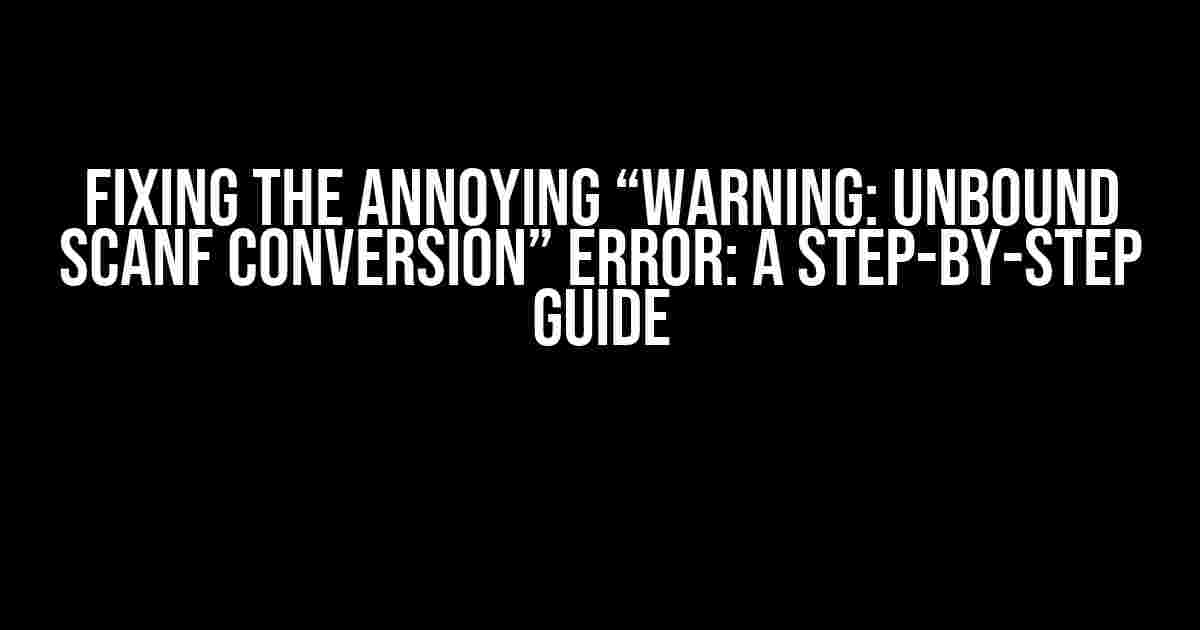Are you tired of seeing the pesky “warning: unbound scanf conversion” error message popping up every time you try to compile your C program? You’re not alone! This warning can be frustrating, especially for beginners who are still getting the hang of using the scanf function. But fear not, dear programmer, for we’re about to embark on a journey to conquer this warning once and for all.
What is the “Warning: Unbound scanf Conversion” Error?
Before we dive into the solution, it’s essential to understand what this warning is all about. The “warning: unbound scanf conversion” error occurs when the compiler detects a mismatch between the format string and the arguments passed to the scanf function.
#include <stdio.h>
int main() {
int x;
scanf("%d", ); // Missing argument
return 0;
}
In the above example, the compiler will throw the “warning: unbound scanf conversion” error because the scanf function is expecting an argument, but none is provided.
Causes of the “Warning: Unbound scanf Conversion” Error
There are several reasons why this warning might occur. Here are some of the most common causes:
- Mismatched format specifiers: Using the wrong format specifier for the variable type, such as using %d for a float variable.
- Missing arguments: Failing to provide the required arguments for the format specifiers.
- Unused arguments: Providing more arguments than the format specifiers.
- Incorrect argument types: Passing an argument of the wrong type, such as passing an int pointer to a function that expects a char pointer.
How to Fix the “Warning: Unbound scanf Conversion” Error
Now that we’ve covered the causes, let’s get to the good stuff – fixing the error! Here are the steps to follow:
Step 1: Check the Format Specifiers
Make sure you’re using the correct format specifiers for the variable types. Here’s a quick reference guide:
| Variable Type | Format Specifier |
|---|---|
| int | %d |
| float | %f |
| char | %c |
| char* | %s |
Step 2: Provide the Required Arguments
Ensure that you’re providing the required arguments for the format specifiers. For example:
int x;
scanf("%d", &x); // Provide the address of x
Step 3: Avoid Unused Arguments
Don’t provide more arguments than the format specifiers. This can lead to unexpected behavior and errors.
int x;
scanf("%d", &x, 10); // Unused argument 10
Step 4: Use Pointers Correctly
When using pointers, make sure you’re passing the correct type and address. For example:
char str[20];
scanf("%s", str); // Passing the array name is equivalent to passing the address
Step 5: Enable Warnings and Errors
It’s essential to enable warnings and errors in your compiler to catch these issues early on. For GCC, you can use the -Wall and -Werror flags:
gcc -Wall -Werror your_program.c -o your_program
-best Practices to Avoid the “Warning: Unbound scanf Conversion” Error
Here are some best practices to keep in mind to avoid this warning:
- Use meaningful variable names: Avoid using single-letter variable names, and opt for descriptive names that indicate the variable’s purpose.
- Check the compiler warnings: Enable warnings and errors in your compiler to catch issues early on.
- Test your code thoroughly: Test your code with different inputs to ensure it works as expected.
- Use scanf safely: Avoid using scanf for user input, and opt for fgets or getline instead. These functions are safer and more secure.
Conclusion
The “warning: unbound scanf conversion” error can be frustrating, but it’s easy to fix once you understand the causes and take the necessary steps to correct them. By following the steps outlined in this article, you’ll be well on your way to writing scanf-free code (just kidding, scanf is useful, but use it wisely!). Remember to enable warnings and errors, test your code thoroughly, and use meaningful variable names. Happy coding!
Still having trouble with the “warning: unbound scanf conversion” error? Share your code in the comments below, and we’ll help you troubleshoot the issue.
Frequently Asked Question
Got stuck with the “Unbound scanf conversion” warning? Don’t worry, we’ve got you covered! Here are some frequently asked questions and answers to help you fix this pesky issue.
Q1: What causes the “Unbound scanf conversion” warning?
This warning usually occurs when the format string in the scanf function doesn’t match the type of the variable being passed as an argument. For example, if you’re using %d to read an integer, but the variable is declared as a float, you’ll get this warning.
Q2: How can I fix the “Unbound scanf conversion” warning?
To fix this warning, you need to ensure that the format specifier in the scanf function matches the type of the variable being passed as an argument. For example, if you’re reading an integer, use %d, if you’re reading a float, use %f, and so on.
Q3: What are the different format specifiers for scanf?
Here are some common format specifiers for scanf: %d for integers, %f for floats, %c for characters, %s for strings, and so on. Make sure to use the correct format specifier for the type of variable you’re trying to read.
Q4: Can I use scanf with variables of type char or string?
Yes, you can use scanf with variables of type char or string. For reading a single character, use %c, and for reading a string, use %s. However, be careful when using %s, as it doesn’t include the null character (\0) in the string, and you need to ensure that the buffer is large enough to hold the input string.
Q5: Are there any alternatives to scanf for reading input?
Yes, there are alternatives to scanf! You can use fgets to read a line of input, and then use sscanf to parse the input string. Alternatively, you can use formatted input functions like fscanf or vscanf. Additionally, in C++, you can use the cin object to read input, which is often a safer and more convenient option.


